Hughie and Krapp’s Last Tape
Hughie
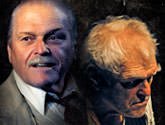
By Eugene O’Neill
Directed by Robert Falls
Krapp’s Last Tape
By Samuel Beckett
Directed by Jennifer Tarver
At The Goodman Theatre
Brian Dennehy devours O’Neill and Beckett one acts
Famed actor Brian Dennehy puts on an acting clinic in O’Neill and Beckett’s one-acts, now playing at the Goodman Theatre’s main stage. Dennehy’s intensely truthful performances that finds him engulfing his characters complete with all their foibles and flaws are a joy to behold. He is a world class actor at the top of his art. He moves from the fast-talking gambler in Hughie to the old recluse fearful of the man he once was in Beckett’s Krapp’s Last Tape. These two pieces demonstrate Dennehy’s acting range.
Hughie:
Eugene O’Neill wrote Hughie in 1941, between the writing of his masterpieces The Iceman Cometh and Long Day’s Journey Into Night. He intended to write seven short one-acts that would essentially be monologues about someone recently departed. O’Neill only finished Hughie in that format. Hughie was published in 1959, performed, starring Jason Robards in New York in 1964, revived in 1975 with Ben Gazzara and in 1996 with Al Pacino.
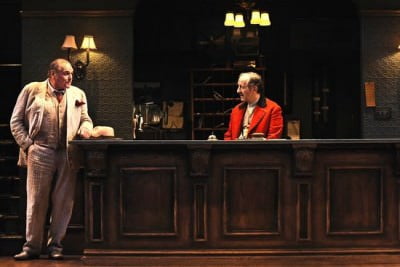
Brian Dennehy stars with veteran character actor, Joe Grifasi in a Goodman Theatre production of Hughie directed by Robert Falls who teamed by with Dennehy in Death of A Salesman. Together these pros deliver a terrific show.
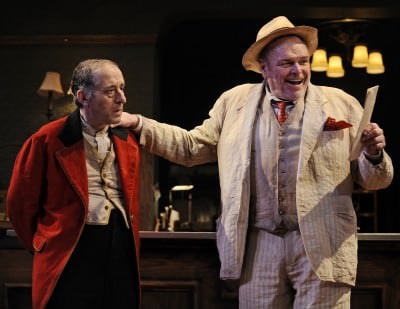
Hughie features an amazingly realistic set, designed by Eugene Lee that features the lobby of an old midtown New York transient hotel, circa 1928. With worn carpet, a mahogany front counter with a cabinet with small slots for each room’s keys and messages adorned with small white and black tile floor and a table with two leather-bound chairs, the seedy hotel reeks with usage.
It is 3AM and A Night Clerk (Joe Grifasi) sits stoically behind the registration desk. Enter an imposing figure, six-three, two hundred-fifty pounds wearing a tan suit with vest and a straw hat with brown and white shoes and a red tie. The man’s dress is disheveled, his walk slightly staggering. He leans against the hotel doorway entrance. The night clerk ignores him as the man starts talking. Brian Dennehy, as Erie Smith, engulfs the stage and commands attention. His character is a small fry gambler, horse player and gofer for the mob who has returned from a four-day drinking binge.
Erie has lost Hughie, the night clerk at the hotel for more than fifteen years. Erie begins a decided one-way conversation with the new night clerk. Slowly, Brian Dennehy unravels Erie’s story in a series of monologues full of gambler language and a cynical outlook on marriage and average working people that contains humor and pathos. O’Neill’s lyrical dialogue paints a stirring picture of how a ‘loser’s self-deception together with the stark reality of death can jolt the gambler to his core. The master storyteller and a master actor weave a marvelously powerful character sketch. Erie speaks about friendship and his need to express himself as a ‘big-shot,’ a ‘high-roller’ and his need to show-off to Hughie, the hotel’s patient night clerk. I’ll bet bartenders and barbers can relate these pipe dreamers.
Joe Grifasi’s night clerk played off Dennehy brilliantly (the two have made many movies together and appeared on stage in several shows) Grifasi is one of those talented supporting actors whom you’ll recognize the face but not the name.
As the story unfolds, we learn much about Hughie but it is Erie’s pathetic regretful life story that rings out in his elaborate fantasies about playing the horses and high life with all the Follies girls. Erie needs Hughie to impress in order to feed his ego and give his lousy life meaning. Eventually Erie, always the master conman, piques the interest of the new clerk as he desperately wants someone to connect with in a cold, lonely city.
Brian Dennehy delivers O’Neill’s gambler and “teller of tales” Erie Smith in memorable performance. There are few actors who can keep our attention telling stories for almost an hour. Dennehy gave a compelling honest humanity to Erie that makes us almost sympathize with him. We feel his pain and his regret and we pity him. I enjoyed seeing a giant talent’s work performed by a marvelous actor. Too bad Hughie is only 50 minutes; I could have stayed another hour to hear both “teller of tales” spin more yarns. Hughie is a “must see” show.
Highly Recommended
Tom Williams
Krapp’s Last Tape:
After Brian Dennehy’s spellbinding performance as the blowhard Erie Smith in Hughie, Dennehy assumes the persona of frail, old man with heavy eyebrows and straggly hair in Samuel Beckett’s one-person one-act, Krapp’s Last Tape—the 1958 take of a 69 year old man who records a tape each year on his birthday chronicling the years events in his life.
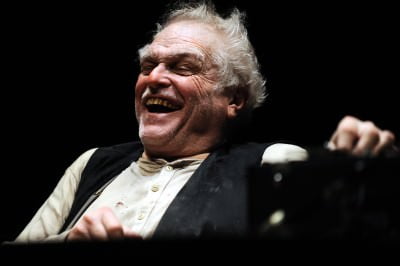
The first 12 minutes of Krapp’s Last Tape are devoid of words as Dennehy demonstrates his absurdly comic side. He shuffles along making sharp turns as he searches for the equipment needed to play and record his yearly thoughts. Dennehy put papers up to his eyes so as to read them without the aid of glasses. He squints to see his ring of keys to open the locked drawers of his desk. Once opened, Dennehy sticks his face into the drawer in order to find a tape but he succeeds in finding a banana with which he sticks into his mouth whole as he throws the banana peels on the floor. The physically clever moments around Krapp’s movements paint a funny, even pathetic image of a rumbled old man near defeat.
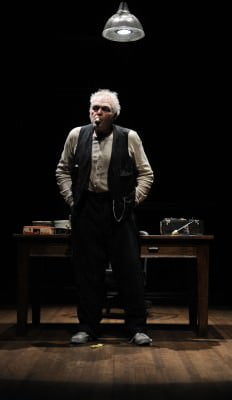
We see Krapp brooding over the diary entries he has recorded on tape over the years. In Buckett’s world, tragedy and comedy coexist and Krapp laments his younger days and long lost loves of his youth. Krapp often leaves his desk to swallow down a few pints just to take off the edge. Dennehy continues to give an acting lesson as how to play absurdist comedy and pathos. As he prepares to record a new tape for his 69th birthday, he begins to listen to his archives. This immersion in his own history leads Krapp to question, with growing regret, whether his present live up to his past. He deeply becomes his character so convincingly that I wanted to take him out for a drink just brighten up his birthday. Brian Dennehy is brilliant in both plays. Don’t miss this amazing performance.
Highly Recommended
Tom Williams
At the Goodman Theatre, 170 N. Dearborn, Chicago, IL, call 312-443-3800, www.goodmantheatre.org, tickets $25 – $83, some Tuesdays at 7:30 pm, Wednesdays at 7:30 pm, Thursdays at 2 & 7:30 pm, Fridays at 8 pm, Saturdays at 2 & 8 pm, Sundays at 2 & 7:30 pm, running time is 2 hours with intermission.
